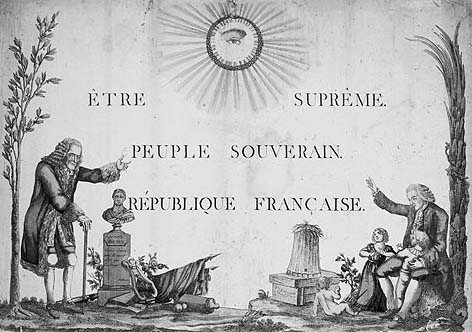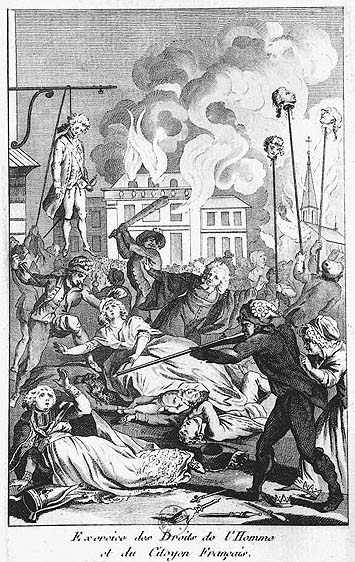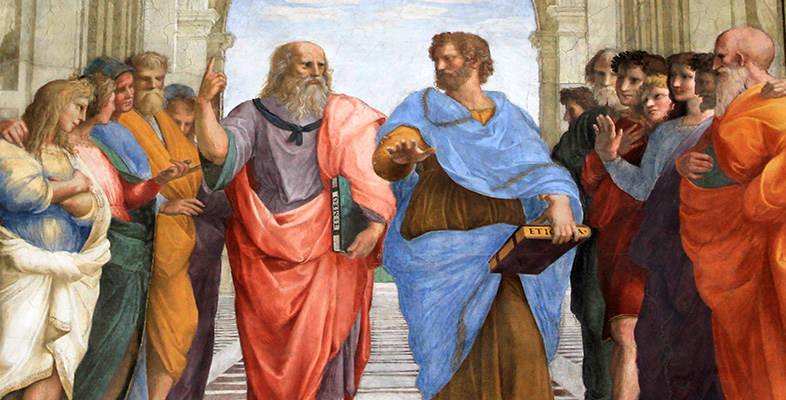8.3.2 Revolution
It cannot be emphasised enough that neither Voltaire nor Rousseau nor anyone before 1789 anticipated the revolution that actually took place in France or the violent and bloody course that it took. What Voltaire looked forward to was an enlightened, humane and orderly society of moderate property owners, a society whose members were guaranteed freedom to worship (or not to worship), to read, publish and discuss whatever they wished, a humane penal system, the rule of law, freedom from arbitrary arrest, and impartial justice for all. These rights were duly proclaimed by the revolutionary National Assembly in 1789 in the Declaration of the Rights of Man and Citizen.
Rousseau, while not disdaining these rights, went much further in his insistence on linking freedom with morality. In The Social Contract he argued that society was a moral entity, not simply the aggregate of selfish individual preferences. The ‘general will’ or consensus of the people constituted a moral imperative binding on all members of society, and which, if they listened to the voice of conscience as well as to reason, all individuals truly desired in their heart. The good society should prescribe the strict morality, frugality and civic-mindedness conventionally attributed to ancient Sparta, republican Rome and Rousseau's native Calvinist Geneva. The state should enforce education and a religion that inculcated these virtues, and in the final analysis it should compel people to be good for, according to Rousseau, only the morally good individual could be truly free. The influence of Rousseau's ideas on the later course of the French Revolution can hardly be doubted. The Social Contract appeared in 32 editions across the decade 1789–99. Revolutionary leaders like Maximilien de Robespierre (1758–94), who came to power in 1793–4 and instigated the Terror, were fired by Rousseau's vision of the good society and cited his works to justify terror and coercion (see Figure 13). Rousseau himself had envisaged much gentler means of effecting change: consensual politics and (in his educational treatise Émile) good parenting lay at the heart of his agenda, rather than the bloodshed of the Terror and the enforcement of revolutionary norms by a minority of visionary fanatics assisted by a politically motivated street crowd.
Summary point: although the Enlightenment helped to prepare a climate of opinion which welcomed the French Revolution, the philosophes themselves did not foresee the Revolution or the way it developed.

It may be questioned whether Rousseau, who had drafted conventional constitutions intended for Corsica and Poland, had not in his Social Contract produced a piece of utopian thinking rather than a blueprint for practical implementation. At any rate, for most philosophes enlightenment was for the educated upper echelons of society. They wrote for the nobility and educated clergy, administrators, lawyers, academics, doctors and journalists, for the good bourgeois, the ‘enlightened’, ‘judicious’ and ‘philosophic’ reader of the Encyclopédie, not for the labouring poor or the unlettered masses. There were only 4,000 subscribers to the Encyclopédie – it was an expensive purchase (Gendzier, 1967, p. xx) – and those in France in sympathy with the Enlightenment numbered perhaps 50,000 out of a population of 20 million. The benefits of enlightenment would, it was hoped, trickle down in due course to the lower classes, but the potential of the masses for unrest was recognised and feared as a constant in history and a positive obstacle. For the masses, therefore, conventional religion remained a useful form of social control: ‘Natural religion for the magistrates,’ Voltaire wrote (in English), ‘damn'd stuff [conventional religion] for the mob’ (quoted in Dorn, 1940, p. 211).
The works of the Enlightenment, then, were produced by and for a cultivated elite. Its culture was that of coffee house, salon, theatre, chateau, academy and club. Its characteristics were sociability, reasonability, wit, learning, style, badinage and civilised discourse. The aristocratic audiences who heard Figaro's reproach to his master Count Almaviva in Beaumarchais's Marriage of Figaro, the Paris ‘hit’ of 1784, or in its operatic version by Mozart (1786), enjoyed the raillery at their own expense:
Because you are a grand seigneur you think yourself a great genius! Nobility, wealth, rank, offices: all this makes you high and mighty! What did you ever do to deserve all that? You took the trouble to be born, that's all!
(Lagarde and Michard, 1962, p. 400; trans. Lentin)
Likewise Mozart's Don Giovanni (1787) opens with Leporello's grumbles about his aristocratic master:
I want to be a gentleman, and I don't want to serve any longer, no, no, no, no, no, no.
(Bleiler, 1964, p. 85)
But reading these works as ‘revolutionary’ may be reading too much into them. In the first place clever and cheeky servants were the staple of comedy and comic opera, and Don Giovanni was described on the title page as just that: a comic opera (dramma giocoso).
At any rate, even though someone in the pit on the first night of Beaumarchais's Figaro is said to have thrown an apple core at a duchess in a box, the aristocratic audiences had no inkling that their status and whole way of life were under threat. The traditional concept of society throughout Europe was a static one based on monarchy and a privileged nobility. If they thought about political revolution at all, it was in terms of a move to a more accountable, constitutional system on the British or perhaps the American model. No one dreamed of social upheaval. Marie Jean Antoine Nicholas de Caritat, Marquis de Condorcet (1743–94), one of the most radical philosophes, ardent for rights for women and blacks, was sure of one thing in 1789: monarchy was impregnable. Mme de la Tour du Pin, a young Frenchwoman in 1789, recalled that she and her aristocratic friends were ‘laughing and dancing our way to the precipice. Thinking people were content to talk of abolishing all the abuses. France, they said, was about to be reborn. The word “revolution” was never uttered’ (quoted in Davies, 1997, p. 674).
If the Enlightenment was elitist it was also male-driven. To some extent this is to misrepresent the period. Engaging women authors included Mary Wollstonecraft (1759–97) and the novelist Jane Austen. Mme de Staël (1766–1817), one of the most influential women of the period, formed a bridge between the Enlightenment and Romanticism. In other respects, however, you may begin to appreciate the very real male bias of the culture and consider the challenges faced even by women with connections of wealth and power like Stael. How much greater, then, must have been the difficulties faced by women like Mary Prince (1788–c.1834), a former slave, in finding a voice with which to express their own views and experiences. It was widely accepted that more educated women might become involved in amateur study such as drawing, music or botany. However, women who, like Jane Marcet (1769–1858), wished to become involved in the study of science, either required influential connections (for example, entrance to a high society salon) or were forced to engage in their study in private, domestic settings such as the drawing room; grand public settings were overwhelmingly a male domain. It is true that French women in particular became much more politically active during the Revolution, and that in Britain women intellectuals such as Wollstonecraft reinforced such efforts. But society generally was not ready to establish or endorse this growing female militancy in any sustained way.
Summary point: Enlightenment culture was mainly by and for the privileged elite. This elite was fearful of the potentially disruptive power of the uneducated masses. Nor was it ready to embrace equality of the sexes.
In every sense the French Revolution came as an appalling shock to the system, and it marks the great watershed in the period covered by this course (see Figure 14). When, at Valmy in 1792, an army of French revolutionaries put to flight a regular Prussian force intent on stamping out the Revolution in the name of the Old Regime, Goethe, who was present, declared: ‘Here today a new epoch of world history begins’ (quoted in Mowat, 1934, p. 328). Condorcet wrote an optimistic Sketch of a Historical Tableau of the Progress of the Human Mind (1793), a noble statement of his faith in the future and a summation of Enlightenment expectations; but he wrote in the shadow of the guillotine, and he committed suicide to avoid execution. The clear-headed confidence, perhaps over-confidence, of the philosophes in the possibility of progress and human potential for good received its comeuppance after 1789. Many began to have second thoughts about their mission, and in their doubts, as well as in the work of those who continued in the mainstream Enlightenment tradition, lie some of the seeds of Romanticism.

Edmund Burke voiced these reservations eloquently in his Reflections on the Revolution in France (1790), which became the bible of those who opposed the Revolution and who took what henceforth was to become known as a ‘conservative’ stance. To those in Britain who expressed admiration for the Revolution and saw it as a model for imitation, Burke argued that the British constitution, far from being (as British radicals argued), a mere political convenience to be rewritten or torn up at will, was an organic entity to be nurtured and venerated like some ancient oak. It was the fruit of tradition, it distilled the collective wisdom of bygone ages, it was a bond between past and present, a trust from history, binding on the living. Sympathisers who applauded Burke included Catherine the Great, on whom Voltaire had lavished praise for her support of Enlightenment causes and as a paragon of ‘enlightened absolutism’, and the historian Edward Gibbon. Gibbon, who in his Decline and Fall of the Roman Empire had exercised much wit and learning at the expense of Christianity, now drew back in fear of the wider, and alarming, social implications of the Enlightenment. Of the French Revolution, Gibbon wrote to his patron Lord Sheffield in 1792, ‘If this tremendous warning has no effect on the men of property in England, … you will deserve your fate’ (Morley, 1891, p. 253). When, the same year, the House of Commons voted against the abolition of slavery, Gibbon declaimed against Wilberforce and his foll owers: ‘in this rage against slavery, in the numerous petitions against the slave trade, was there no leaven of new democratical principles? No wild ideas of the rights and natural equality of man? It is these I fear’ (Hampson, 1968, p. 153). For in Britain, to be radical meant to aim at reform of an ineffective and corrupt monarchy and electoral system; to be extremely radical meant sharing the views of Mary Wollstonecraft, Thomas Paine (1737–1809), Joseph Priestley, Thomas Beddoes (1760–1808), William Godwin (1756–1836) and others (including the poet William Wordsworth, 1770–1850), who all, at least initially, expressed enthusiasm for the French Revolution and called for far-reaching democratic reform at home, thus intensifying the vehement conservative backlash.
Summary point: the French Revolution strongly divided educated opinion in Europe. To be against the Revolution was to adopt a ‘conservative’ philosophy, which cast doubts on the reformist ambitions of the Enlightenment.
